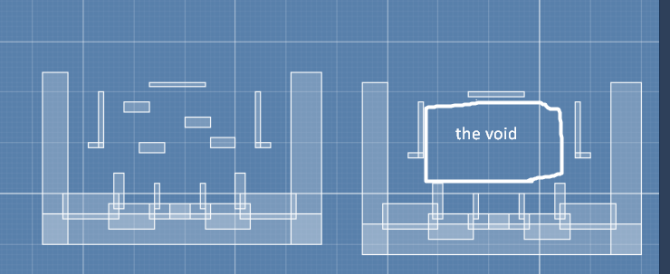“Inside Max’s head” introduced the seldom discussed idea that any map are just as good as any other. A lot of people have taken inspiration from this, yet a lot of people seem to raise objections, which I completely agree on. Every truth is a half-truth. This post will be contradicting Inside Max’s head and will be presenting the flip side of the coin to balance things out. This post will be about how to make a better map, with focus on Singleplayer maps first, then dive down the rabbit hole on fundementals.
I’ve always been reluctant to make this post, because I’ve been afraid to choke creativity by saying “Hey, this is how you should go about making maps.”I think that stuff stifles creativity (especially my own) and the map-maker because too concerned about fitting some sort of standard. Having said that, I think I now know how to say the things I want to say in the least damaging way.
This will not be a read that will discuss technicalities in the editor, such as colliding walls. Nor a read to make more artistic maps, I’m not nearly qualified to do so. This will provide signpost that will assist in making excellent maps in terms of general game design/level design guidelines, but I will be using PB2 as examples.
Interest
Maps should start off with something that increases a player’s interest in the map. For example a promising storyline or something that invokes curiosity, or a high-action scene that immediately gets the players hooked and engaged. Then the map should slow down so the excitement builds, and then builds towards a final climax. Non-stop action gets tiring and worst off all, the blood becomes kind of meaningless. If the map doesn’t invoke interest right off the map, most players quickly play another map.
Purpose
What Eric fails on the single-player campaign is give us a reason to kill all of these enemies. If we spawn in a prison, our purpose is obvious, to escape. If we witnessed someone stealing our princess, it’s obvious that we ought to save her. Even though I’ve been in the PB2 community for ~5 years, I still don’t understand the time machine thing, and the campaign was just a drag.
Of course, a lot of player’s criterea for an enjoyable map is something to shoot at, but if you want to aim at excellence, give the player a clear goal, give the player a purpose. Remember, deep down everyone just want to help.
Make the map enjoyable to mess around in
Directed at MP maps: One very basic criteria for a good map is just play it for yourself for an hour just navigating it. You know you’ve hit the jackpot if just jumping around is enjoyable. That’s the core enjoyablity, anything else (enemies) is just an extra. And you should not rely entirely on the extra.
Surprise the player
It’s something about unpredictability that we humans just love. If you have surprised your player in some way in your map, they will be constantly on their toes expecting another surprise, this is a great way to keep them playing. In MP maps, give players the opportunity to surprise each other, and perhaps take use of randomness to spice things up. See Max teabag-opensource for the randomizer.
HOW TO NOT SUPRISE:
- Don’t mix unpredictability of uncertainty. Don’t make enemies with different health/different properties look the same. It will ruin the credibility of the map and this is this type of uncertainty drives players nuts in a bad way.
- Don’t punish the player for not have played the map before. It’s unfair and a serious buzzkill and just plain annoying to get killed for unenviable stepping on an invisible chainsaw activator from hell.
Keep the player in a flow state
Gradually increase the feel of power while increasing the opposition slightly faster. This is probably the most nuanced point, but hear me out. If the difficulty on the map is the same throughout the map, it will give the potential problems. #1: It’s too easy and the player gets bored. #2: It’s too hard and the player gets frustrated. #3: The difficulty is fine but it gets repetitive. What you want to do is let the player feel powerful doing easy work, then face a stressful challenge, then after hard work they can feel powerful and do easy work again, and so it repeats. A crappy figure:
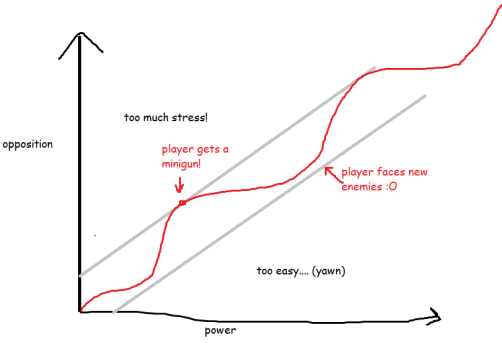
This creates a satisfactory and exciting cycle for the player. It helps to think of the two reasons why people, well, do stuff! To seek pleasure and to avoid pain. If the player only experiences pleasure in your map, say, killing a bunch of zombies, it quickly loses it’s satisfaction. If you only punishes the player, in the forms of death, setbacks or hell, even verbal abuse! #trigger42. Then the player hates you, rates 1 and goes back to excl-school. You need to balance pleasuring and punishing, they give each-other meaning.
How to pleasure:
- Visual affirmations. New skin, new location.
- More power, cooler guns, abilities.
- Sweet talk.
- Killing, gore, destroying your enemy
Replayability
You’ve done a good job it if you have managed to give the players a reason to re-play the map several times. This is a rare case(lol), but it’s because it’s been such an enjoyable experience they want to re-play it. A huge motivator to gain replayability is if you implement a score system. Say at the end of the map you reveal how the player could’ve done better, in the sense of how many players they’ve killed, how fast they completed the map, how many golden stars they have collected(see Max teabag2-economy), etc, or a combination. To motivate the player to actually do these things, you should rewards players with a key they can send you, then so you can put them on some sort of hall of fame.
It is a bummer Eric did not implement this into the game, as it would have made SP-maps actually competitive and far more interesting, let’s hope for PB2.5 though.
Choices
Another way to make the player replay the map is give them choices. Which door to open? Whom to ally? Kill the CS-troop or spare him. If you let the player know their choice had something to say, their interest in the map skyrockets, as they are playing their own story in their heads, and they might want to replay to give the most of the map. A brilliant way to present choice is to use the “High-risk, high reward” and “Low-risk, low reward” system. Does the player want to do some platforming to get that minigun upgrade, but risk falling down into acid, or does he have more faith in his shooting skills than jumping skills? Presenting choices isn’t hard and makes for a world-class map.
To spark the inner explorer in a player. reveal some alternative(secret) routes that players can find better weapons, shortcuts, etc. This will drive most players madly in love with you as you’ve transformed your map from a dull ride to the end to a mystery of undefined discoveries. By giving the player freedom to choose between entering the battle or smell the roses makes the player feel in control, of course, you need to constrain the player sometimes too. If the player is free all the time, the freedom doesn’t mean anything. Closed areas provide the free areas and vice versa. In a MP map where you can go anywhere any time, players will hardly find eachother and their “freedom” becomes a constraint.
Simplicity
To keep your map elegant, look at every section of your map and explain to yourself what is the purpose of that being there? This is a nuanced point. I’m not suggesting that remove that room that has nothing in it, but be aware that because it has nothing in it, it might serve some sort of purpose after all.
Story
While it’s not inherently bad to have a lot of dialog in your map, most map-makers can’t figure out why nobody reads their dialog. Hmm! Maybe it’s because you always display text in the middle of an alien invasion? 10 lines of dark colored text and bng’s coming at my way…. it’s just overwhelming, dude. Be very selective of what text to show and especially when. Be wary of creating special moments in your map where something dramatic/awesome happens, and don’t distract the player by having the hero’s character talk about how much he loves toast.
If you love dialog, and want to write more interesting ones, write down all the characters of your map down on a paper. Write down their status(high/low) and their relationship and how they feel about each-other, write down some obscure or not oscure thing that has recently happened between them that might’ve altered their behavior towards one another. Write down personal traits and quirks of each character, what do they like to do on saturdays? What iconic line do they have? By writing these things down it becomes surprisingly easier to make much better and novel dialog rather than the generic “There’s an alien, shoot him!” type of stuff.
An old famous movie story making tool is the twelve points of the hero’s journey. Now, there is absolutely no need to take in account all the points, but it’s a great tool for some inspiration and gives you a place to start when creating a story.
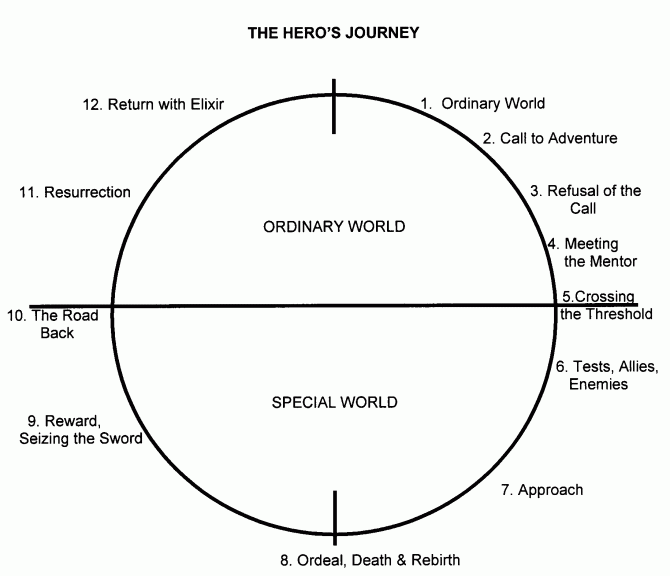
Have people play your map
I’m baffled over how people publish their map without getting any options about it. If you find a friend that’s brutally honest, for god’s sake make him play every map of yours and never let him go. If you’re lucky enough to have a friend IRL that can play your map, you will then witness when they get frustrated, or when the rage quit, or even punch you in the face. Regardless, you need to be open to suggestions, and if you want to master map-making, you need to master the subtle art of knowing that people really mean when they give suggestions. Don’t be a developer without a spine changing everything that people suggest. Find out why they suggested that in the first place and make changes accordingly. People don’t really know what they want.
Fundementals
What makes really for a good atmosphere in a map. We all know that inexplicable feeling that some maps just feel ‘right’, they have something special to them and that might give us that warm feeling of homebelonging.
Scaling
Different scaled elements bring life to the map. If the objects scale down or up in a recognizable pattern, the map be naturally pleasing to the player. The trick is to find the amount of level of scale of each jump.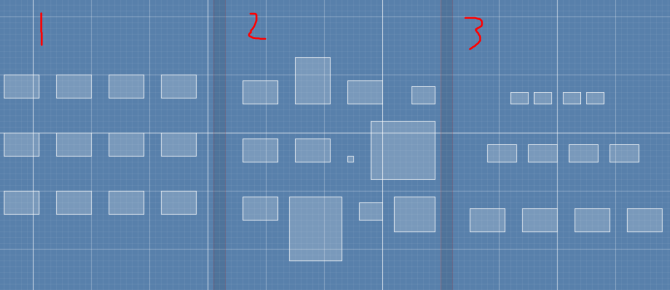
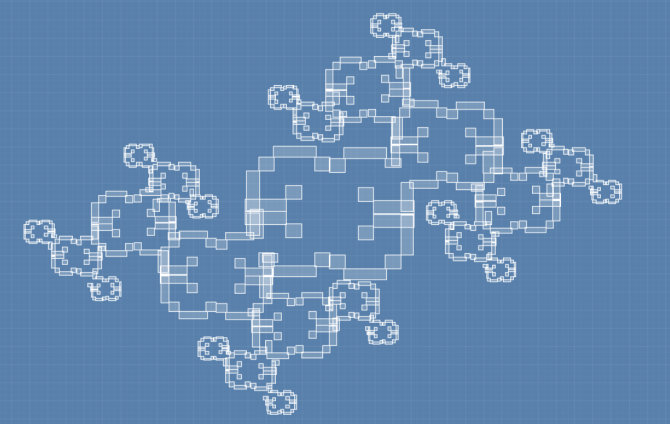
Centers
A strong center is a strong map. It seems like we players crave a place of heat of the map, if the center of the map is clearly defined, we feel in a weird way compelled to arrive there, it gives us a good inner feeling to know where to go if we don’t have any other specific plans. The living room of the map, the place where we always seek to return.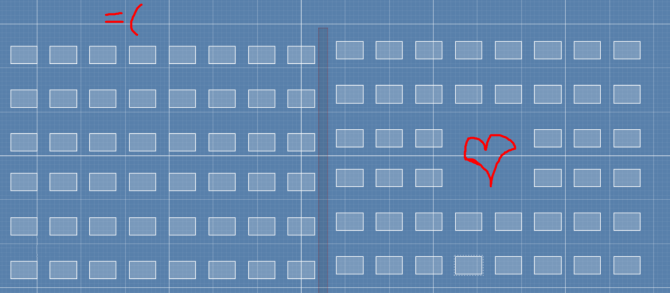
You can strengthen the center by making other centers that lead the players toward to the final center. Centers are in some way made out of all the other centers.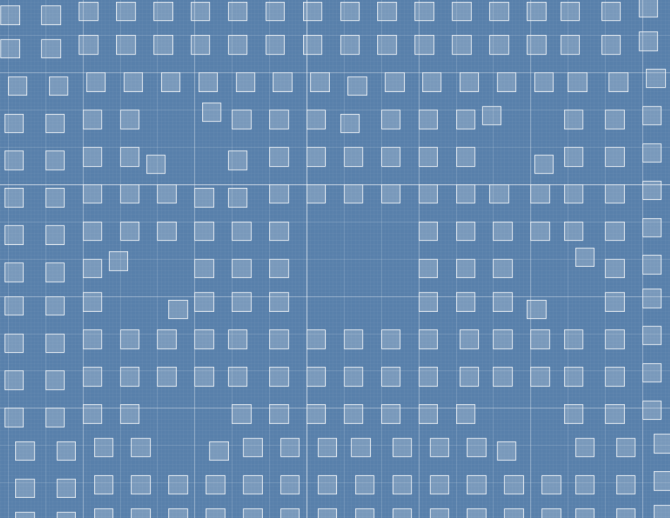
Constraints
Constraints is what gives the center, well context. constraints strengthens the role of the center. When I suggest adding constraints, most people are (understandably) naturally not compelled to do so, it is after all a negative word! The paradox about constraints is that because it separates, it also unites.
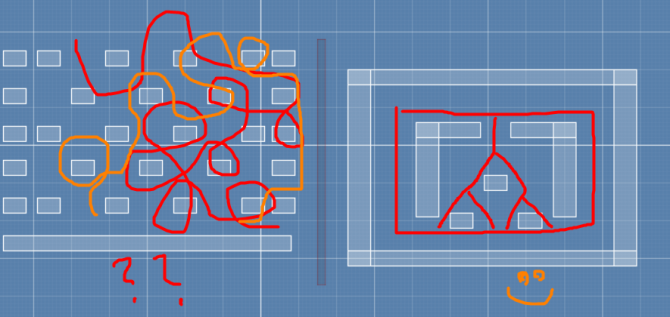
Shapes/Area harmony
Shapes should not only define themselves, but define and engage the area around itself and vice versa. 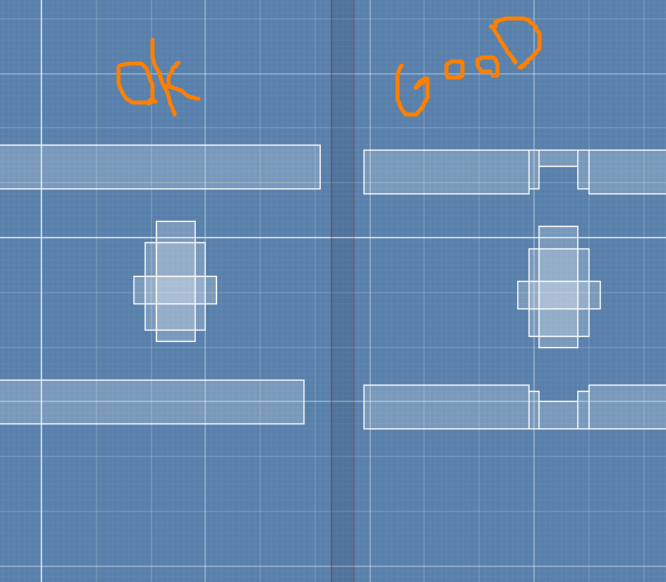
This example was very clear-cut obvious, but the real magic happens when every single object on the map is on some indirect, subtle way engaging the other and so that no object is a meaningless leftover. Think of it like the butterfly effect.
Transitions and seperateness
You can further define an area by creating a complimentary transition from the area to another. Have you ever seen a map where there’s a random building that seems like it’s missing a purpose, or rather a proper shape? By making an interlock that compliments both areas, it makes the map feel more alive as the areas are kind of “aware” of each other and creates a sort of non-seperateness.
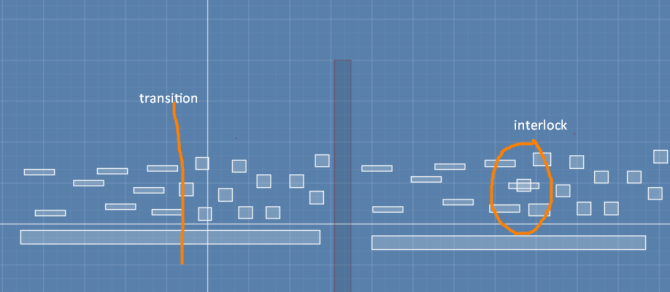
Roughess
There’s something about roughness that just… works. The property of an artist’s brush is it’s inaccuracy, it paints in a way that the artist have no control over. If art was up to human perfection (using a sharp pen) the art would lose it’s beauty. Sometimes you just have to let go and let the chaos have it’s way. Sometime the things without meaning is the things that have the most meaning.
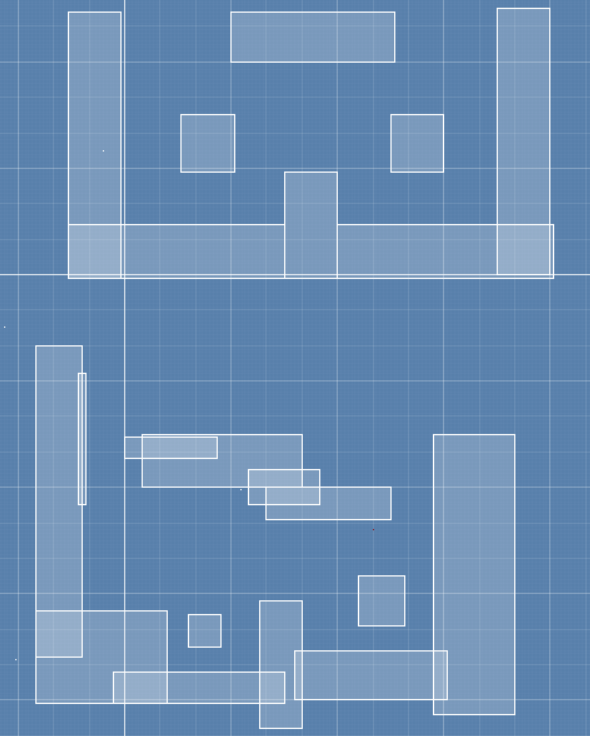
The echo
Consistency is important. Websites with a different font on every page would drive us mad. It’s nice to see some of the same elements to what we’ve seen earlier in the map. It generates a sort of general wholeness in the map. When I say elements, I am very vague. This can range from a type of shape to a general similarity of areas, where the same type of structure echoes throughout the map, not necessarily in a repetitive form, but in a way where the player feels that the entire map is one.
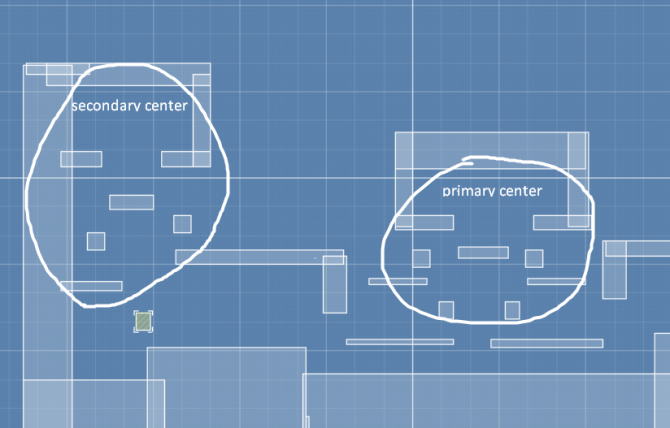
The void
As in music, it is the silence that gives the sound depth. In a speech, it’s the pause that give the thing that comes next extraordinary meaning. Create spaces of emptiness, to give more meaning to the content around it.
